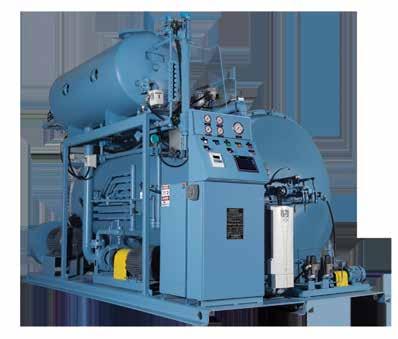
15 minute read
Chapter Reports
from CHF Fall 2020
by MediaEdge
The cool weather arrived in Alberta in September, and we had our first frost in Calgary. (Nothing to brag about.) The board of directors meeting that usually coincides with the CHES National conference was a virtual event this year. I missed seeing all my exalted executive colleagues and friends in person. It’s great that technology allows us to continue our efforts to promote the goals of CHES, educate members and ensure excellence in healthcare facility management.
National Healthcare Facilities and Engineering Week was Oct. 18-24. This was a wonderful opportunity to highlight all the great work we do daily to support the delivery of healthcare in our respective provinces.
This year has turned out to be a bit of a dumpster fire but it’s almost over. 2021 offers hope to a return to some normalcy. Most of us are likely busy dealing with the challenges of maintaining our respective facilities during the pandemic. Too many priorities and limited resources. However, our dedication and commitment will see us through. Stay positive.
I hope you and your friends and family are safe and have not been negatively impacted by the black cloud hanging over our heads.
—Dan Ballantine, Alberta chapter chair
BRITISH COLUMBIA CHAPTER
2020 has seen its share of disappointments with the cancelling of both the B.C. chapter conference and the CHES National conference in Halifax. It has challenged us all to come up with innovative ideas as we move forward and find a new normal during the pandemic. Ensuring our own health and that of our fellow coworkers has become a priority as we continue to serve in healthcare.
On July 30, we held our first Zoom annual general meeting, with 30 people in attendance. We officially welcomed Doug Davis as the chapter’s new secretary. I’d like to thank Ken Van Aalst for serving on the executive team as treasurer and secretary for the last 10 years.
As part of our education program, we continue to provide CHES webinars at no charge to B.C. members. We added several COVID-19 webinars, which included presentations by Mitch Weimer and Steve McEwan. I encourage all chapter members to take advantage of these webinars as they are a great opportunity to learn and discuss our experiences with healthcare staff across Canada.
We are starting to plan for 2021, and our chapter conference in Penticton. At this time, we are looking at presentation options and how we can meet as a membership should our current provincial orders remain.
—Norbert Fischer, British Columbia chapter chair It took some time but we are now used to the new norm of our Maritime bubble. Unfortunately, due to COVID-19, we had to postpone our 2020 fall education day at the Best Western Glengarry in Truro, N.S.
The planning committee is working on the 2021 CHES National Conference, which will be held Oct. 17-19, at the Halifax Convention Centre. The theme is, ‘Enriching Patient Experiences by Optimizing the Environment.’
The recipient of this year’s Per Paasche bursary, valued at $1000, is Patrick LeBlanc from Bedford, N.S. Patrick is pursuing mechanical engineering at the University of Ottawa. His interest in mathematics, science, problem solving and making a positive change inspired his decision to pursue a career in the engineering field. In his free time, he enjoys playing hockey and guitar, and is an avid runner. Patrick is the son of CHES Maritime member Dave LeBlanc. Dave is a project manager with the Nova Scotia Department of Transportation and Infrastructure Renewal, building project services division, engineering design and construction, in Halifax.
The chapter is able to balance its books while offering several financial incentives to members in the way of student bursaries, contributions to Canadian Certified Healthcare Facility Manager (CCHFM) exam fees, webinars, the fall education day and other rebates.
—Helen Comeau, Maritime chapter chair
SASKATCHEWAN CHAPTER
On behalf of the Saskatchewan chapter, I would like to acknowledge the province’s frontline workers, management staff and teams for their hard work and dedication during this trying time, and express everyone’s gratitude and sincere appreciation for all that you have done and continue to do.
Each fall, we are normally frantically preparing for our annual conference and trade show. Unfortunately, as is the case with all chapters, the conference was cancelled because of COVID-19. It has been rescheduled for Oct. 18-20, 2021, at the Delta Hotel in Regina.
On June 19, the chapter offered a one-day virtual session for members on programming and design considerations for healthcare facilities in the post-COVID-19 era.
CHES Saskatchewan is in a solid financial position. As a result, we have made a sizeable donation to the province’s organ transplant unit.
The chapter executive continues to meet via conference calls to keep everyone up-to-date on what’s happening in the province. Our annual general meeting was held Oct. 20. It was a virtual meeting by Zoom, with help provided by CHES National.
—Greg Woitas, Saskatchewan chapter chair
If there was ever a time to send a bouquet of flowers, it is now. A huge thank you to the residents of Newfoundland and Labrador for a job well done with managing COVID-19, and the frontline workers who helped us through the unknown. Near and dear to my heart is everyone in healthcare, especially the facilities people who are easily missed as they work tirelessly behind the scenes. Since March, they’ve prepared sites for the influx of COVID-19 patients through renovations, installations and increasing surge capacity, and have continuously adjusted plans based on the latest information. Their hard work, dedication and commitment is greatly appreciated.
COVID-19 has a way of kicking you when you are down. Not only has it physically impacted the body of those who have contracted the virus, but it has wreaked havoc on the economy. Husky Energy has delayed the White Rose extension project by another year, effectively putting hundreds of skilled trade construction jobs on hold. While Husky conducts a full review of the project and its future in Atlantic Canada, Newfoundlanders and Labradoreans are bracing for what could be a doom and gloom future.
That being said, there is still much to celebrate in the healthcare sector, with the announcement and erection of new hospital, clinic and long-term care home projects by various health authorities in the region.
The chapter has always struggled to recruit and retain members for various roles. However, I am pleased to announce Mary Ann Head has joined the CHES National communications committee. Mary Ann has been a member and supporter of CHES for many years and brings extensive infection and prevention control experience to the chapter. The executive team is now full, with members serving on various committees.
The chapter is looking to capitalize on the recent announcement of Eastern Health’s first public-private partnership project. We hope to recruit membership from private construction, as well as gain information from this sector.
Other chapter goals going forward include finding ways to better communicate with members across the province.
The chapter is sitting in a solid financial position. With no travel in the near future, expenses will continue to be next to none.
—Colin Marsh, Newfoundland & Labrador chapter chair
ONTARIO CHAPTER
As the pandemic continues to impact our healthcare organizations and CHES activities, the value of a CHES membership and the networking opportunities with other members and vendors has proven to be indispensable. The information shared through the COVID-19 webinars alone has been worth the cost of membership.
The pandemic has also forced many of us to face the disappointment of cancelling our travel plans to attend the CHES National conference in Halifax. I was personally looking forward to all the planned events and seeing my CHES colleagues from across Canada. Although we currently do not have the luxury of meeting in person, virtual Zoom meetings have allowed us to at least remain visually connected.
The chapter executive has held regular meetings through Zoom, which included our annual general meeting in June. At the time, a motion was made and adopted that the current executive continue for an additional term, ending at the International Federation of Healthcare Engineering (IFHE) Congress in Toronto, in 2022. Since then, the chapter executive had an opportunity to meet face-toface Sept. 15, in London, Ont., in a socially distanced environment.
The chapter continues to engage in reciprocal opportunities with other organizations like the Canadian Centre for Healthcare Facilities, International Association for Healthcare Security and Safety and long-term care associations. The chapter executive is continuously looking for ways to deliver member benefits through other means.
CHES Ontario’s spring conference is scheduled for May 16-18, 2021, in Niagara Falls. Ron Durocher and his team are well underway planning the event. There will be no chapter conference in 2022, as we will host the IFHE Congress that year. The 2023 conference is slated to be held in Windsor.
Planning continues for the 2022 IFHE Congress. The team convened via Zoom in August, marking our first meeting since February due to COVID-19. There is a wealth of conference planning experience on the team, with members from coast-to-coast, as well as the U.S. and Australia. I am confident it will be a conference to be remembered.
On behalf of the Ontario chapter, I would like to congratulate this year’s CHES award winners: Interlake Eastern-Regional Health Authority and the Selkirk Regional Health Centre (Wayne McLellan award), Ron Durocher (Hans Burgers award) and the Maritime chapter (President’s award).
—Jim McArthur, Ontario chapter chair
MANITOBA CHAPTER
Around the world, daily life as we know it has changed due to COVID-19. The Manitoba chapter has experienced its share of challenges as we work through a new way of doing business virtually as opposed to in person. The chapter, just like all the others, had to cancel our spring conference and trade show.
The 2021 CHES Manitoba Conference and Trade Show is scheduled for May 3-4, at the Victoria Inn Hotel and Convention Centre in Winnipeg. The theme is, ‘Renovations in Healthcare Facilities.’ I look forward to seeing everyone again next year, albeit under much different circumstances than 2019.
With this year’s CHES National conference in Halifax postponed until 2021, the Manitoba chapter will now host the coveted event in 2023. Planning will continue in the near future.
Red River College’s Building Efficiency Technology Access Centre, in conjunction with the Manitoba chapter, has put in a request for funding of a study, COVID-19 Infection Prevention and Control: Assessment of Humidity and Temperature in Long-term Care Homes for Seniors. We are currently awaiting the results of our collective request.
CHES Manitoba introduced two new awards of excellence in 2020, one for facilities management and the other for project management. This provides an opportunity for the chapter to recognize individuals who have excelled in their line of work. This year’s Facilities Management Award of Excellence went to Bill Algeo of Health Sciences Centre Winnipeg. The recipient of the Project Management Award of Excellence is Gary Dandeneau, regional director of capital planning and facilities management at the Interlake-Eastern Regional Health Authority. Congratulations to the first awards recipients. We encourage Manitoba chapter members to nominate candidates for 2021.
Also new this year, the Manitoba chapter sponsored the Award for Power Engineering Technology at Red River College. The $1,000 bursary was presented to Eric Juskowa, a power engineering technology student who completed the first term of the program with a minimum 3.0 grade point average.
As a reminder, the Canadian Certified Healthcare Facility Manager (CCHFM) designation is offered through CHES. Information is on the website. Certification demonstrates you have the necessary education and experience, confirmed by an outside body, to qualify as an elite professional in the healthcare facilities field. The Manitoba chapter will cover the cost of the CCHFM self-assessment exam for members attempting it for the first time. If successful in passing, the chapter will pay for the member to take the certification exam.
In support of continuing education, the chapter is committed to paying for regular members to take part in this year’s CHES webinar series. Details are on the Manitoba chapter page of the CHES website.
—Reynold J. Peters, Manitoba chapter chair
We take care of your marketing outreach so you can focus on your association.
Our award-winning marketing team has helped countless companies - for over 25 years successfully fulfill their marketing needs.

Contact us today to learn how our 360 Marketing Suite can become your association’s full service marketing agency of choice.
CHES Canadian Healthcare Engineering Society

SCISS
Société canadienne d'ingénierie des services de santé
CALL FOR NOMINATIONS FOR AWARDS
2021 Hans Burgers Award for Outstanding Contribution to Healthcare Engineering DEADLINE: April 30, 2021
To nominate: Please use the nomination form posted on the CHES website and refer to the Terms of Reference.
Purpose: The award shall be presented to a resident of Canada as a mark of recognition of outstanding achievement in the field of healthcare engineering.
Award sponsored by
2021 Wayne McLellan Award of Excellence in Healthcare Facilities Management DEADLINE: April 30, 2021
To nominate: Please use the nomination form posted on the CHES website and refer to the Terms of Reference.
Purpose: To recognize hospitals or long-term care facilities that have demonstrated outstanding success in completion of a major capital project, energy efficiency program, environmental stewardship program or team building exercise.
Award sponsored by
For Nomination Forms, Terms of Reference, criteria, and past winners www.ches.org / About CHES / Awards Send nominations to: CHES National Office ches@eventsmgt.com Fax: 613-531-0626
The Rewards of Heat Recovery Why now’s the time to invest in a heat recovery chiller

As COVID-19 has put additional stress on our HVAC systems, facility managers will need to fi nd ways to save energy and maintenance funds where they can. Heat recovery chillers, widely found in today’s state-of-theart new hospitals, provide a double economic benefi t: 1) they reduce the heating load, and 2) they reduce the ancillary power needed to reject the heat, thereby reducing energy costs. Some building owners are turning to heat recovery simply for its environmental benefi ts and carbon credits. And more good news for facility managers? Heat recovery chiller replacements are gaining traction in existing hospitals too. Energy funds and utility rebates are covering the retrofi t costs, freeing up valuable maintenance and capital budgets.
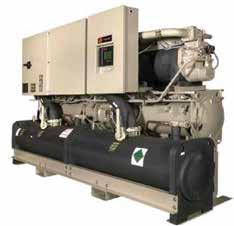
TECHNOLOGY AND PROJECTED SAVINGS:
Unlike traditional chillers that waste heat generated from the cooling process, waterside heat recovery chillers capture and apply it to various heating loads—from process and commercial loads, to the potable water used for showers, washing and laundry.
Healthcare facilities benefit greatly from these chillers because of the year-round, simultaneous heating and cooling loads required to maintain essential operations. In fact, several hospitals in B.C.—including University
of BC Hospital, Vancouver General Hospital, Eagle
Ridge Hospital and St. Paul’s Hospital—have already undergone plant upgrades using Trane’s RTWD Heat Recovery Chillers.
Units at these fi ve sites range in capacity from 80 tons to 250 tons and account for 10 to 50 per cent of total peak cooling loads. Some of the units run 24/7, providing continuous heat to the hospital. While individual projected energy savings range from 8,000-40,000 Giga-Joules per year of gas savings, all combined, the fi ve projects have projected energy savings of over $1M annually for the province!
Chiller Plant Manager Heat Recovery Dashboards
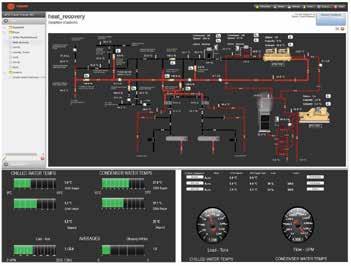
IS MY SITE SUITABLE FOR A HEAT RECOVERY CHILLER RETROFIT?
If you have mandates to reduce gas consumption, and your healthcare facility has year-round simultaneous heating and cooling loads (i.e. server rooms, labs, large domestic hot water loads, or high comfort temperatures required for long-term stays), chances are it’s a good candidate. Most medium and large healthcare facilities fi t the requirements for energy funding, utility rebates, and a projected payback of 4 to 6 years with waterside heat recovery retrofi ts.
The fi rst step is to consult with your maintenance team to determine which of your heating and cooling assets are nearing end-of-operation. Similarly, once your facility has made the decision to move forward on a replacement project, be sure to involve your hospital’s key personnel at the onset. Your FMO team, consultants, projects team, energy manager, and service provider will all have important perspectives needed when upfront design considerations are being made.
FULL STEAM AHEAD
At Trane, we are continually amazed at how much excess heat energy hospitals generate that could be captured and put to good use. We’re excited to be at the forefront of this exciting opportunity! Please contact your local Trane Service team to find out if you should be looking for waterside heat recovery to pay for your next retrofit. Email info@tranecanadawest.com or call 1-800-473-5600 to be connected to the Trane office nearest you.
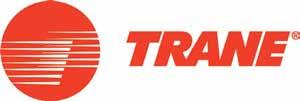
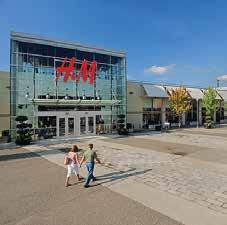
HEAT RECOVERY SYSTEM DELIVERS PROVEN RESULTS Believing in sustainability and that conservation of resources is a corporate and individual responsibility, Morguard, working with Trane, implemented a heat recovery system in 2016 to reuse waste heat at Coquitlam Centre.
Trane engineers, Morguard Operations Team, and SES Consulting worked together to verify design details and the feasibility of the heat recovery system for the 9,350,000 sq. ft. retail shopping mall.
Knowing the configuration of the centre’s mechanical room with chillers and boilers in the same area, the team developed a sequence of operations to maximize the use of the recovered heat and compiled energy savings projections for the project.
Using a Trane Series R (model RWTD) heat reclaim chiller and boiler plant, the system operates in a staged configuration to maximize the use of lowgrade heat. The heat recovery chiller’s evaporator (cold side) is piped into the condenser loop (warm side) of the main building chiller to capture the waste heat from the main chiller before it is sent to the cooling tower. The heat recovery chiller then boosts the temperature up to the heating water supply temperature setpoint (140 F/60 C) and injects it into the heating loop.
Based on the projected energy savings, the upgrade earned a substantial incentive from FortisBC to help fund the heat recovery improvements. The project is generating considerable energy savings, with early results showing a 55 per cent reduction in total natural gas consumption on site. Based on the year over year savings, the project is expected to have a four- and half-year total payback.
See the full case study at: www.tranecanadawest.com/casestudies








